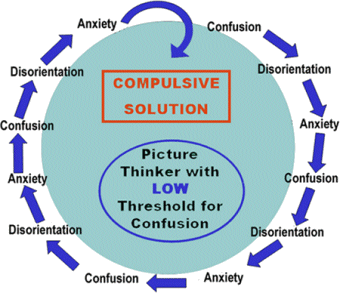Procrastination…..
The Grammarly Blog has a wonderful article about procrastination. They start by identifying the primary reasons for procrastination:
- overwhelm
- confusion
- boredom
- lack of motivation
- distraction
They offer some tips to begin to cope with the issue. But as I was reading the article, I was struck by the fact that they have listed the same mental states that are so often associated with disorientation. And I can certainly attest from personal experience that the dyslexics in my family are also master procrastinators.
So I started to ponder the connections. (Naturally, I am doing this during a time that I ought to be very busy doing something else…. but I digress).
To start with, the feelings of overwhelm, confusion, and distraction are all both symptoms and causes of disorientation. When triggered, those feelings set off a cycle that feeds on itself. The person becomes more overwhelmed, more confused, more distracted. 
So we can see easily how the tendency to disorient that is part of dyslexia will also easily become part of a pattern of procrastination. Thus, in a dyslexic, the tendency to procrastinate is not merely an avoidance tactic or “old solution.”
When we consider that the result of disorientation is loss of mental focus — the mind wanders — we can then see how easy and common it is that the dyslexic pattern of procrastination will typically lead to the person losing track of time and forgetting whatever it was they were supposed to be doing.
The Grammarly blog posst offers some practical tips to help manage the feelings of overwhelm or confusion, such as making a to-do list and taking on tasks one step at a time. Looking at the problem from a Davis viewpoint, however, I realize that procrastination may just be one other manifestation of the same disorientation problem we see in other contexts. Perhaps we need to begin by finding out what triggers the disorientation. Addressing the trigger is probably only a starting point, but the need to address that may explain why strategies such as making lists never worked for me.
My problem was that if I started a project by making a list, sometimes I got so caught up in making the list, I’d forget about the project. And then I would revise the list, or decide to create a new list from scratch, or simply lose the list and have to start over. Rather than making headway, making lists became an additional mechanism for delay. One with the added benefit at least allowing me to pretend I was making progress. I hadn’t even begun the task… but look, I made a list!
So, at least for me, recognizing the disorientation connection is a start. I’m not knocking lists — they can be very useful, and I effectively use lists all the time for the type of work I do enjoy and finish. It’s just that I see now that the list only becomes useful when other triggers for disorientation have been eliminated.











The ‘Procrastination Cycle’ is a sound model. I like Orlin Miller’s quote “If you want to make an easy job seem mighty hard, just keep putting off doing it.” True 😉